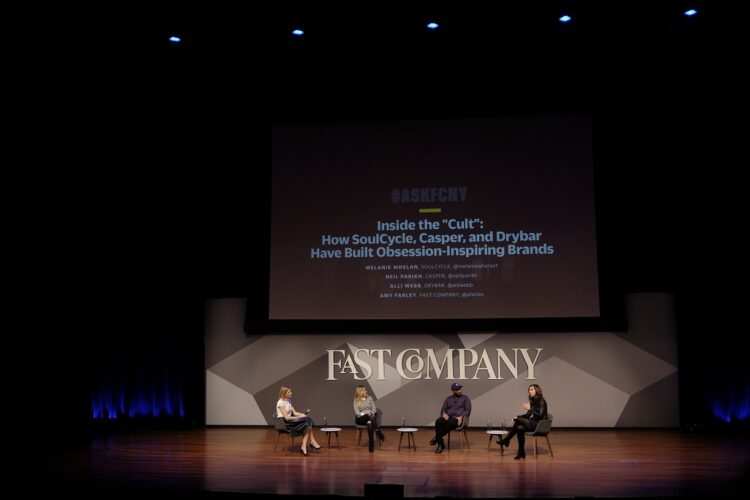
You know those brands that your friends just can’t stop talking about? The ones they become obsessed with and try to get you to join along? I attended the panel “Inside the Cult: How SoulCycle, Casper, and Drybar Have Built Obsession-Inspiring Brands,” at the Fast Company Innovation Festival for just that reason— to learn more about what drives people to have intense brand loyalty. Having heard so much about these three brands myself, it was interesting to hear from the founders to learn what they attributed their success to, and how they all grew, almost seemingly overnight, to businesses with massive followings.
The discussion started off with the moderator asserting that all three brands took something that was a chore— getting your hair done, buying a mattress, working out— and made it a fun experience. Neil Parikh, cofounder and Chief Operating Officer of Casper, discussed how they took an antiquated model that hadn’t been innovated on in decades and made it relevant by connecting it to the trends of health and wellness that millennials are focused on today. By focusing the brand more heavily on investing in sleep and the importance of that to our health and wellbeing, Casper struck a nerve with their consumers. Alli Webb, founder of Drybar, also echoed the sentiment of taking a process that many women go through— getting a blowout— and making it into something new, exciting, and relevant. Gone are the days of sitting in expensive salons, or cheap chains. Webb created an experience that touched exactly what her customers needed; an affordable, great blowout. Meghan Whelan, CEO of SoulCycle, agreed that building a cult-like brand all came back to building experiences. SoulCycle, she explained, considers each ride a production. It goes beyond the workout to the inspirational coaching, the music, and how their riders behave in the world. As an example, SoulCycle created lobbies that are conducive to riders getting to know each other.
One thread stuck throughout the entire discussion as the biggest attributor to all three companies’ successes and followings: customer service. Whelan explained that at SoulCycle, the front desk employees are trained in a “culture of yes,” where employees are trained according to company policies and best practices, and then given “freedom within a framework” to support customers as they see fit.
Front desk employees are dedicated to their riders, learning about them, and making sure they have a great experience each and every time the riders walks through the doors— even if something goes wrong. Webb explained a similar focus at Drybar— each stylist is trained in the styles that Drybar offers but is encouraged to give it a bit of a twist to make it their own, giving them ownership over their blowouts. Parikh shared that at Casper customer service is also of the highest priority, especially with something as important as sleep. He shared a story of a couple ordering a mattress for their arrival home with their first child and it didn’t arrive in time. They put the couple up in a hotel for the night— how could they not?, he asked. Parikh explained that it is their goal to always go above and beyond with their customer experiences, especially since a mattress is a once in 7 year purchase. They only get one shot.
A last theme that emerged is that all three companies had a single offering: SoulCycle offers cycling classes, Drybar offers blowdries, and Casper only has one mattress (as well as sheets and pillows)— how do you stand out among the crowd? How do you keep people interested? And what do you do about copycats? Whelan offered that SoulCycle’s biggest competitor is not another spinning studio, it’s Netflix. Individuals are busy, complex, stressed— how does SoulCycle compete with the urge to go home after a long day and watch TV? They do so by creating memorable experiences, inspiring experiences, and making each ride unique even if it follows a similar formula. By empowering their riders, working out becomes more than a chore— it’s something they look forward to. Parikh shared that their competition is still the corner store mattress company, 90% of mattresses are sold in-person and it’s a hard sell online. They optimize their experience through great customer experience and by creating marketing that is relevant for everyone. By creating ads that are focused on fun graphics and information about sleep, bringing nap pods to festivals, and being in interesting, unexpected places your customers are, you will stay relevant and exciting. Lastly, Webb shared that while there are now numerous copycats of Drybar, and sometimes it can lead to market confusion, it’s overall a good thing for the category. Blowdry bars are still a relatively new concept, so with several other chains out there, more and more individuals are learning about it and getting roped in.
Building a business with a cult following is not always easy, but with great customer service, staying relevant to your customers, and creating relevant experiences, Drybar, Casper, and SoulCycle have grown exponentially.



